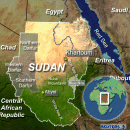Sudan rebels seek weapons, food aid
By Levon Sevunts, The Washington Times
AMARAY, Sudan, Aug 21, 2004 — Like Western governments and international relief groups, rebel leader Suleiman Jamous worries about getting food to victims of ethnic cleansing in western Sudan.
 But he is also seeking modern weapons to build his ragtag Sudan Liberation Army into a force that can capture cities abandoned earlier to Sudanese troops and force the government to grant equal rights to non-Arabs in the region.
But he is also seeking modern weapons to build his ragtag Sudan Liberation Army into a force that can capture cities abandoned earlier to Sudanese troops and force the government to grant equal rights to non-Arabs in the region.
“We need SAMs to shoot down Antonovs; we need anti-tank weapons, we need ammunition,” said Mr. Jamous, referring to anti-aircraft missiles and the aging Soviet-built planes used by Sudan’s army.
Mr. Jamous, a tall, gaunt man, wearing the traditional long shirt and a turban made from camouflage netting, is the No. 3 official for the Sudan Liberation Army (SLA) in northern Darfur.
He is also the coordinator for humanitarian affairs in the SLA’s political affiliate, the Sudanese Liberation Movement.
“We have about 600,000 civilians living in the areas under our control,” Mr. Jamous said. But it’s a number that is hard to verify. There has been no reliable census data in Sudan for years.
And despite the presence of SLA troops, who roam the countryside with heavy machine guns mounted in the back of their pickup trucks, most civilians are too terrified of the Sudanese army to come back to their villages from their hiding places in the hills and deserts.
Those who show up at wells, filling goat skins with water for the rest of the family still hiding in the hills, tell of misery and impending hunger.
Muhammad Abdurahim Ishag, a stocky, muscular peasant who looks 20 years fitter than his 65, said his family has been surviving on wild herbs and makhet, a pealike fruit that the locals eat when they have nothing else.
The women have made forays close to government-controlled cities to buy some food, Mr. Ishag said.
“The government doesn’t allow any food to leave the cities,” Mr. Ishag said, watching his youngest son filling goat skins with water, “so our friends smuggle out food and sell it to us outside the cities.”
The SLA marks Aug. 1, 2001, as the beginning of its insurrection.
“In 2001, the army massacred 57 civilians in a place called Tuel,” Mr. Jamous said. “So the whole area was angry and joined the SLA. The news spread that the government was killing even innocent civilians who had nothing to do with the SLA.”
Mr. Jamous said the uprising grew out of resentment over the campaign of forced Arabization carried out by successive governments in Khartoum.
“They [the government] have gathered landless Arabs from Chad, Mali, Niger and Central African Republic, promising them to settle them in the lands of the African people of Darfur,” he said. “This has been going on since 1982, when the first cases of ethnic cleansing started … The government then denied responsibility, blaming it on tribal conflicts.
“But we knew who was behind the killings and the burning of the villages.”
The present campaign by the Sudanese army and the Janjaweed to suppress the uprising in Darfur only flooded the SLA with thousands of additional volunteers.
Mr. Jamous himself is a perfect example of what drove thousands of people in Darfur, one of Sudan’s most underdeveloped areas, to take up arms against the government.
A graduate of the University of Alexandria in Egypt, he speaks perfect Arabic, but he could never breach a glass ceiling in his career.
He worked at a paper-producing company, was employed by the government, set up his own business, but as an ethnic Zaghawa he was never allowed to rise above a certain position in Sudanese society, he said.
“Sudan has been ruled by a clique of Arab elites,” Mr. Jamous said. “All the development – economic projects, health care and education – has been concentrated in Arab areas but they represent only 15 per cent of Sudan’s population. We want to change that. We want equality, we want development – electricity, clean water, roads, schools. We want democracy.”
